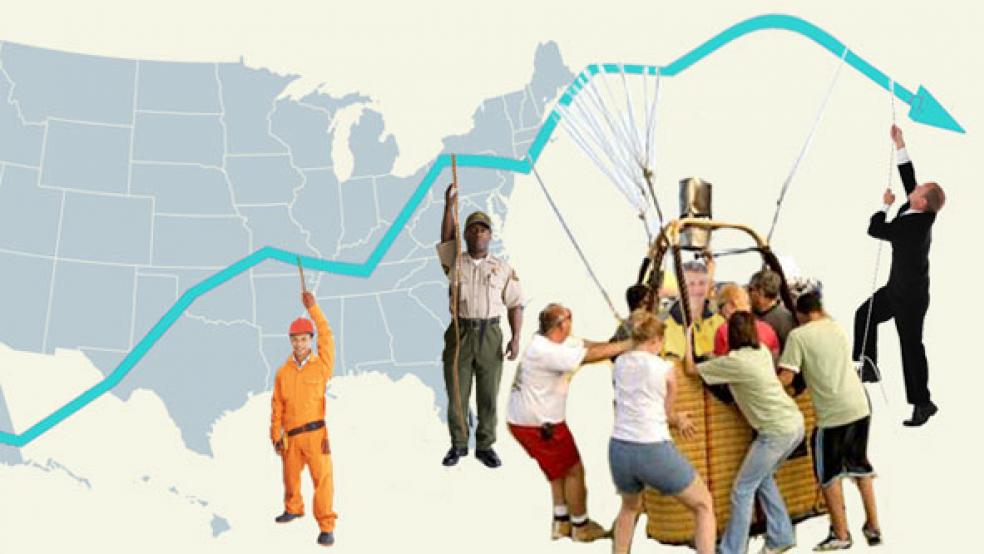From the end of World War II until the 1970s, the growing prosperity in the US was widely shared across income groups. However since the 1970s, households at the lower end of the income distribution have experienced income stagnation – “real average hourly earnings (excluding fringe benefits) now stand roughly at 1974 levels”– while those at the top of the distribution have continued to do quite well. The result has been ever-widening income inequality, and inequality has now reached levels rivaling those that existed during the Gilded Age.
Inequality is already high, and if it continues to grow it could reach the point where it becomes morally intolerable, and there is evidence that social ills grow as inequality widens. But there is an economic reason to care, as well.
There is an equivalent of a Laffer curve for inequality, but the variable of interest is economic growth rather than tax revenue. We know that a society with perfect equality does not grow at the fastest possible rate. When everyone gets an equal share of income, people lose the incentive to try and get ahead of others. We also know that a society where one person has almost everything while everyone else struggles to survive – the most unequal distribution of income imaginable – will not grow at the fastest possible rate either. Thus, the growth-maximizing level of inequality must lie somewhere between these two extremes.
We may be near or even past the level of inequality where growth begins falling. The evidence on this is highly uncertain, so it’s difficult to say. But a few more decades like the last few could make the difference, so why take a chance? I’d prefer to see policies implemented to reduce inequality – given the present, elevated level of inequality, a reduction is unlikely to have much of an impact on incentives. But at a minimum we should resist further increases. This will reduce the chance of crossing over the point where growth starts to diminish rapidly, and it also reduces the chance that we will surpass the point where inequality causes cracks in the social structure.
We must ensure that the rising economic tide
lifts all boats, not just the yachts.
I’ve never favored redistributive policies, except to correct distortions in the distribution of income resulting from market failure, political power, bequests and other impediments to fair competition and equal opportunity. I’ve always believed that the best approach is to level the playing field so that everyone has an equal chance. If we can do that – an ideal we are far from presently – then we should accept the outcome as fair. Furthermore, under this approach, people are rewarded according to their contributions, and economic growth is likely to be highest.
But increasingly I am of the view that even if we could level the domestic playing field, it still won’t solve our wage stagnation and inequality problems. Redistribution of income appears to be the only answer.
The rest of the world has a huge supply of excess labor, and it is developing rapidly. So long as developing countries can continue to draw upon excess labor to expand economic activity, there will be little pressure for wages to rise and workers in the U.S. will continue to struggle. Until the rest of the world is more developed, or stops growing in a way that substantially alters the global pattern of production, a time that looks to be far, far away, unskilled workers in the U.S. will not get their share of economic growth.
We’ve given the market economy 40 years to solve the problem of growing inequality, and the result has been even more inequality. Markets do not appear to be able to solve this problem on their own, at least not in any reasonable timeframe. Some people say education is the answer, but we have been trying to reform education for decades, yet the problems remain. The idea that a fix for education is just around the corner is wishful thinking.
If we want to preserve a growing and socially healthy economy, and avoid moving to lower growth points on the inequality curve, then we will need to do much more redistribution of income than we have done over the last several decades. We must ensure that the rising economic tide lifts all boats, not just the yachts. That means the wealthy will no longer get it all, they will be asked to share economic growth with the workers who helped to bring it about, workers who ought to be rewarded for their growing productivity.
We can expect considerable protest when the wealthy are asked to give up a portion of the growth that has been flowing exclusively to them for so long, and we’ll hear every reason you can think of and a few more as to why redistributive polices are bad for America. But sharing economic gains among all those who had a hand in creating them is the right thing to do. For the foreseeable future, redistributive polices appear to be the only way to ensure that workers receive their share of the growing economic pie.



